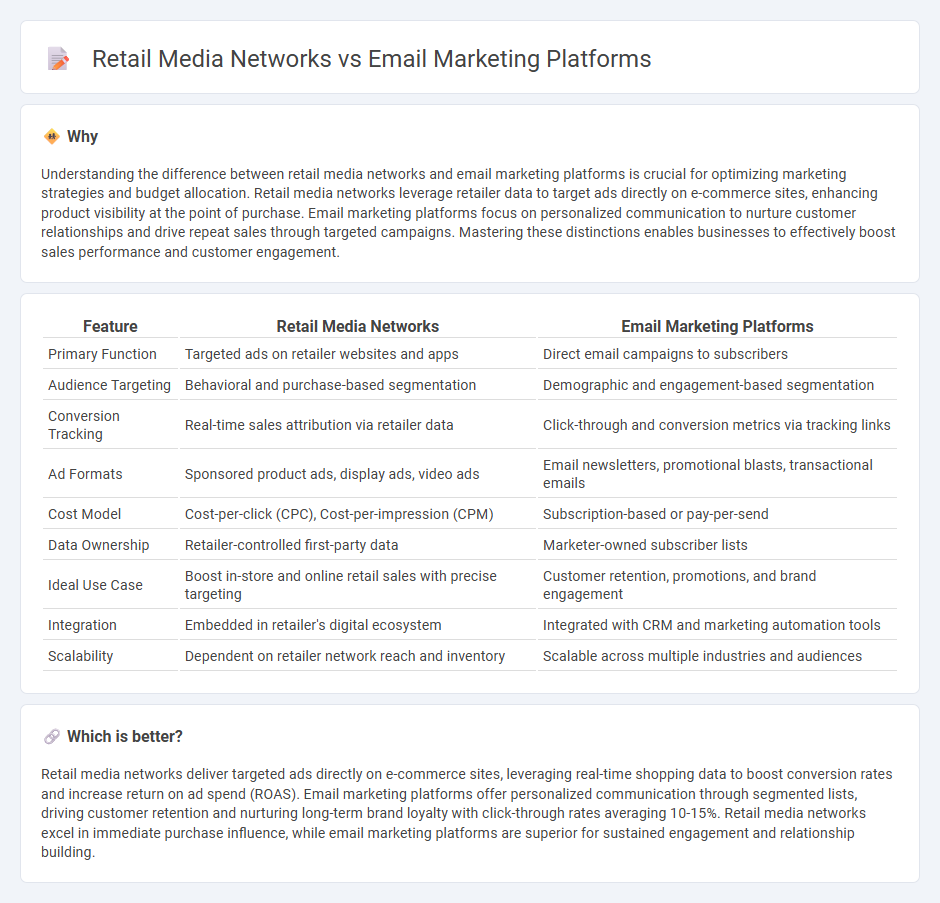
Retail media networks leverage consumer shopping data to deliver targeted ads at the point of purchase, driving higher engagement and conversion rates compared to traditional methods. Email marketing platforms focus on direct communication, offering personalized promotions and customer relationship management through segmented lists and automated campaigns. Explore the strengths and strategies of each to optimize your commerce marketing approach.
Why it is important
Understanding the difference between retail media networks and email marketing platforms is crucial for optimizing marketing strategies and budget allocation. Retail media networks leverage retailer data to target ads directly on e-commerce sites, enhancing product visibility at the point of purchase. Email marketing platforms focus on personalized communication to nurture customer relationships and drive repeat sales through targeted campaigns. Mastering these distinctions enables businesses to effectively boost sales performance and customer engagement.
Comparison Table
| Feature | Retail Media Networks | Email Marketing Platforms |
|---|---|---|
| Primary Function | Targeted ads on retailer websites and apps | Direct email campaigns to subscribers |
| Audience Targeting | Behavioral and purchase-based segmentation | Demographic and engagement-based segmentation |
| Conversion Tracking | Real-time sales attribution via retailer data | Click-through and conversion metrics via tracking links |
| Ad Formats | Sponsored product ads, display ads, video ads | Email newsletters, promotional blasts, transactional emails |
| Cost Model | Cost-per-click (CPC), Cost-per-impression (CPM) | Subscription-based or pay-per-send |
| Data Ownership | Retailer-controlled first-party data | Marketer-owned subscriber lists |
| Ideal Use Case | Boost in-store and online retail sales with precise targeting | Customer retention, promotions, and brand engagement |
| Integration | Embedded in retailer's digital ecosystem | Integrated with CRM and marketing automation tools |
| Scalability | Dependent on retailer network reach and inventory | Scalable across multiple industries and audiences |
Which is better?
Retail media networks deliver targeted ads directly on e-commerce sites, leveraging real-time shopping data to boost conversion rates and increase return on ad spend (ROAS). Email marketing platforms offer personalized communication through segmented lists, driving customer retention and nurturing long-term brand loyalty with click-through rates averaging 10-15%. Retail media networks excel in immediate purchase influence, while email marketing platforms are superior for sustained engagement and relationship building.
Connection
Retail media networks leverage first-party consumer data to deliver targeted advertisements across digital platforms, enhancing retail sales. Email marketing platforms integrate with these networks by utilizing customer purchase histories and browsing behavior to create personalized email campaigns. Combining retail media insights with email marketing increases customer engagement and drives higher conversion rates by delivering relevant content through multiple channels.
Key Terms
Audience Targeting
Email marketing platforms enable precise audience targeting through segmentation based on user behavior, demographics, and purchase history, fostering personalized and direct communication. Retail media networks leverage rich first-party retail data to target consumers at the point of purchase, optimizing ads for higher conversion rates within e-commerce environments. Explore deeper insights on how these targeting strategies can amplify marketing effectiveness.
Attribution
Email marketing platforms provide detailed tracking of customer interactions, enabling precise attribution of conversions to specific campaigns and emails through unique tracking links and open rates. Retail media networks leverage first-party shopper data within e-commerce ecosystems to attribute sales directly to ads displayed on retailer sites, offering highly accurate insights into in-store and online purchase behavior. Explore the nuances of attribution strategies to optimize your marketing ROI effectively.
First-party Data
Email marketing platforms harness first-party data by collecting direct customer interactions such as clicks, opens, and purchase history to deliver personalized and targeted campaigns. Retail media networks leverage first-party data aggregated from retail transactions and shopper behavior across physical and digital stores to optimize ad placements and maximize ROI. Explore how leveraging first-party data differently in these channels can elevate your marketing strategy and drive deeper customer engagement.
Source and External Links
8 Free & Cheap Email Marketing Software Tools 2025 - Lists top email marketing platforms including Brevo, Moosend, MailerLite, Benchmark Email, Getresponse, AWeber, ActiveCampaign, and Kit, highlighting their key features and user focus.
11 Best Email Marketing Platforms for Small Businesses (2025) - Reviews top platforms like Brevo, HubSpot, and Mailchimp with details on features such as drag & drop editors, automation, segmentation, AI assistance, and customization tools tailored for small businesses.
13 Cheap Email Marketing Tools For 2025 [Pros & Cons] - Moosend - Highlights Moosend and other affordable platforms for marketers, emphasizing features like advanced segmentation, automation, personalization, easy-to-use editors, AI content generation, and integrations with CRM systems.
 dowidth.com
dowidth.com